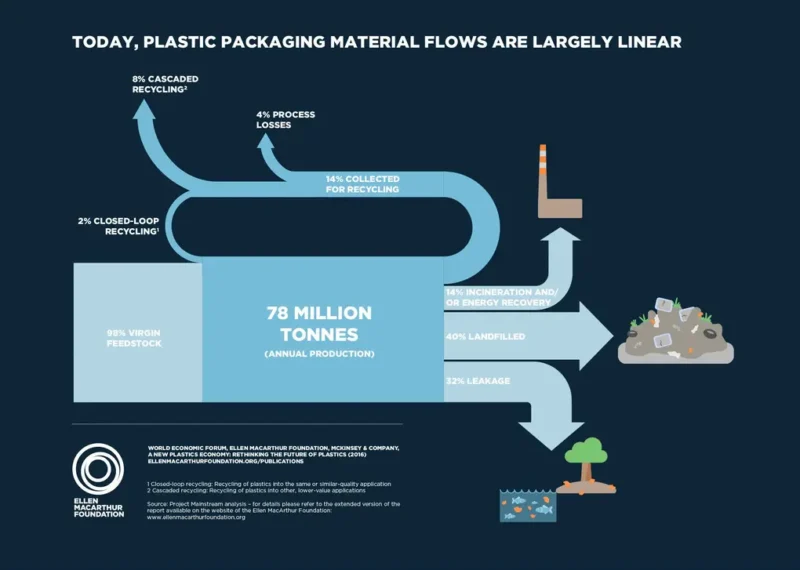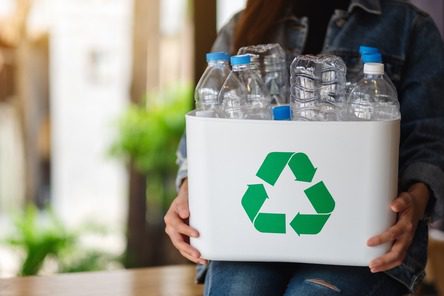Packaging has become an essential part of our lives. From the food we eat to the products we buy, almost everything comes in a package. However, traditional packaging materials like plastic, paper and metal can have a significant impact on the environment. The good news is, sustainable packaging has emerged as a viable solution to this problem. Recyclable plastics, in particular, have gained popularity as a way to reduce waste and pollution.
So grab a cup of coffee (reusable cups only please!) and dive into the world of recyclable plastics, how they contribute to sustainability and some of the challenges associated with using them.
How big is the plastic problem?
According to research by the Ellen Macarthur Foundation globally we produce 78m tonnes of plastic, of which we really reuse only 2%. A whopping 86% or 67m tonnes is basically dumped into the environment either through leakage into rivers and seas, landfill or through incineration. That’s the equivalent of 5m Big Bens of plastic every year..

In the UK, according to research by Manchester University:
- In 2021 the UK generated 2.5m tonnes of plastic waste – just 44% was recycled (DEFRA, 2022).
- The UK sends 60% of its plastics abroad, exporting the problem to countries not all able to process properly’ (DEFRA, 2022). The great Pacific garbage patch comes from the UK aswell
- There is a lack of standards across UK waste disposal: over 391 different local authorities in the UK have an estimated 39 different bin regimes.
So there is a clear problem with our addition to plastic unless we want to choke off our lands and air! But what’s the solution??
What are recyclable plastics?
Recyclable plastics are a type of plastic that can be reprocessed and used again after they have been used. They are different from non-recyclable plastics because they can be transformed into new products rather than ending up in landfills. When plastics are recycled, they can be reprocessed into new products, reducing the need for raw materials. They can help reduce pollution by preventing plastics from entering our oceans. Recyclable plastics can also have a lower carbon footprint than other packaging materials, such as glass or aluminium, which can require more energy to produce and transport.
Recyclable plastics are often labelled with a recycling symbol and a number that identifies the type of plastic. The most commonly recycled plastics are:
- PET (polyethylene terephthalate) used in water bottles

- HDPE (high-density polyethylene) used in milk and detergent bottles

However, thanks to advances in technology and infrastructure, it’s been made possible to recycle other types of plastics, such as LDPE (low-density polyethylene) used in shopping bags and cling film and PP (polypropylene) used in food containers and yoghurt pots.
By choosing products that use recyclable plastics, you, as a consumer, can make a more positive impact on the environment and help build a more sustainable future.
How do recyclable plastics contribute to sustainability?
Recyclable plastics can make a significant contribution to sustainability, both by reducing waste and preventing pollution. Here’s how:
- Reduce waste: One of the biggest advantages of using recyclable plastics for packaging is that they can help reduce the amount of waste that ends up in landfills. When plastics are recycled, it conserves resources and also helps to minimise the environmental impact of plastic waste.
- Prevent pollution: Recyclable plastics can also help prevent pollution by keeping plastics out of the environment. When plastics are not disposed of properly, they can end up in our waterways, causing harm to marine life and ecosystems. By using recyclable plastics, we can reduce the amount of plastic waste that ends up in the environment and help to prevent pollution.
There are also several other environmental benefits of using recyclable plastics for packaging. For example:
- Lower carbon footprint: The production of raw plastic materials requires a significant amount of energy, resulting in greenhouse gas emissions. By using recycled plastics, we can reduce the energy required to produce new materials and reduce the carbon footprint of plastic packaging.
- Resource conservation: Recycling plastics can help conserve natural resources, such as oil and gas, which are used to produce raw plastic materials.
- Energy savings: Recycling plastics can also save energy, as it takes less energy to recycle materials than to produce new ones.
What are the challenges associated with using recyclable plastics?
While recyclable plastics have many benefits, there are also several challenges associated with using them for packaging. The most significant challenges include:
- Limited availability: Not all types of plastic are easily recyclable and not all recycling facilities are equipped to handle all types of plastics. This can lead to limited availability of recycled plastic materials, which can make it difficult to use them for packaging.
- Higher costs: Using recycled plastics can be more expensive than using raw plastics. This is because recycled plastics often require additional processing and sorting, which can drive up the cost. Additionally, the cost of recycled plastics can be influenced by market demand and the availability of raw materials.
- Contamination: Contamination can be a significant issue when it comes to recycling plastics. Even small amounts of non-recyclable materials, such as food residue or dirt, can render the plastic unrecyclable. This can lead to waste and make it more difficult to obtain high-quality recycled plastics.
How we can overcome these challenges
While the challenges associated with using recyclable plastics can seem daunting, there are several measures that can be taken to overcome them. For example:
- Invest in infrastructure: To increase the availability of recycled plastics, it is essential to invest in recycling infrastructure. This can include building more recycling facilities, improving existing ones and investing in technology that can sort and process more types of plastics.
- Encourage demand: By increasing demand for recycled plastics, the market for these materials can be strengthened, which can help to drive down costs.
- Improve recycling processes: To reduce contamination and increase the quality of recycled plastics, it is crucial to improve recycling processes. This can include investing in better sorting technology and educating consumers about proper recycling practices.
So, while there are challenges associated with using recyclable plastics for packaging, they can be overcome with the right measures. With better infrastructure and improved recycling processes, we can make recycled plastics a more viable and sustainable solution for packaging.
What are the big businesses doing in this area?
It will be of little surprise to anybody that many large companies have contributed to the negative impacts on the planet through their business practices. This includes the production of non-recyclable plastics, greenhouse gas emissions and other harmful practices. However, it’s important to acknowledge that these companies also have the potential to drive positive change and contribute to sustainability efforts.
Businesses need to step up and make real, sustaining change. And we have a responsibility too, to pester them, feedbaclk to them, or boycott them until they bring about change. Otherwise they’re creaming off the top whilst drowning our world with garbage. For example, from Plastic Soup Foundation:
- Coca Cola sells 100bn plastic bottles a yr
- In 1990 it promised to use an average of 25% of recyclates in its PET bottles
- Now, three decades later, that percentage is only 10%
- Over the years the recyclate goal has been constantly moved, the last time as part of Coca-Cola’s World Without Waste initiative
- It now says that in 2030, its bottles will be made of 50% recycled material.
The responsibility for addressing environmental issues extends beyond large corporations. As individuals, we also have a role to play in reducing our environmental impact through our consumption habits and daily actions. By holding companies accountable and making sustainable choices ourselves, we can work towards a more sustainable and environmentally responsible future.
Make a commitment to reduce your own environmental impact by recycling, reducing waste and making sustainable choices in your daily life. If you’d like to see how ‘green’ you are, take our greenscore test now.
